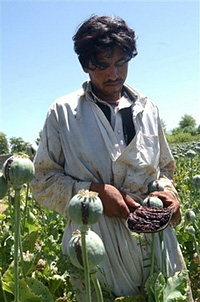 |
 |
 |
 News from Around the Americas | April 2007 News from Around the Americas | April 2007  
NATO's Mixed Messages on Afghanistan's Opium Crop
 Francoise Chipaux - Le Monde Francoise Chipaux - Le Monde


| | An Afghan farmer youth collects resin from poppies on a opium poppy field in Bati Kot district of Nangarhar province, east of Kabul, Afghanistan, Tuesday, April 24, 2007. NATO said this week that it has withdrawn a radio message telling Afghan farmers that its troops will not destroy their opium fields, following complaints that the alliance appeared to condone the illicit crop. (AP/Rahmat Gul) |
On the flip side, Great Britain is the lead country in the fight against drugs in Afghanistan. On the obverse side, Great Britain - the troops of which are fighting in Helmand province, the premier in importance for poppy cultivation in Afghanistan - has had NATO broadcast messages on a local radio station assuring farmers that foreign and Afghan security forces were not there to destroy their fields. "The ANA (Afghan National Army) and the ISAF (International Security Assistance Force, directed by NATO) are not going to eradicate your poppies because the ANA and the ISAF forces know that the population here has no other income and that's why it grows poppies. The ANA and the ISAF do not want to deprive the population of its income," asserted the text. NATO has since withdrawn the broadcase from the airwaves.

This message, in complete contradiction with official policy, shocked the Afghan authorities. "Our campaign against drugs is underway. The international forces made mistakes in one or two districts where military operations were taking place, for which they have apologized," General Mohammad Daoud, vice minister of the interior in charge of the anti-drug fight, explained on Ariana Television. "We ask the ISAF to avoid this type of mistake in the future, since it creates multiple problems for the anti-drug strategy in Afghanistan," asserted Zalmay Afzali, a spokesman for the Anti-Narcotics Ministry.

92 Percent of Global Production

Acknowledging that the message had been "poorly drafted," the ISAF spokesperson, Angela Billings, settled for affirming: "We support the Afghan government in its efforts."

The police and specially trained forces ensure the eradication - preached by both the international community and the Afghan government - of the poppy, 6,100 tons of which Afghanistan produced in 2006: i.e., 92 percent of global production. NATO, like the coalition forces led by the United States, refuses to intervene in the anti-drug war for fear of alienating the population of the regions in which their troops are deployed and throwing those populations into the arms of the Taliban. At the same time, NATO leaders assert that opium proceeds (about $3 billion in 2006) feed the Taliban insurrection, which has developed solid connections with drug mafias.

Since the fall of the Taliban in 2001, and despite the $2 billion spent in the fight against the drug, its cultivation and production have continuously increased. According to the United Nations Office on Drugs and Crime (ONODC), 2007 production could overtake that of 2006, which already constituted a record level. Particularly in the southern provinces where the Taliban are most active, the acreage under poppy cultivation has grown again this year.

In any case, NATO's message, broadcast as its troops conducted a military operation in the region during the last seven weeks - the results of which are yet to be seen - illustrates the absence of coordination between the various actors on the Afghan scene and the goals they pursue.

Translation: t r u t h o u t French language correspondent Leslie Thatcher. | 
 | |
 |



